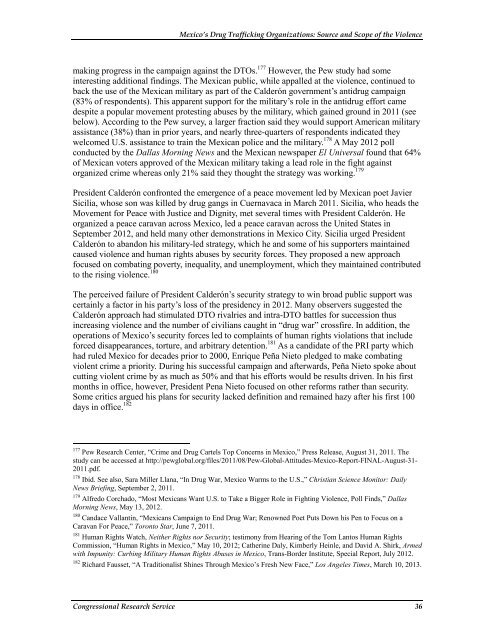Mexico's Drug Trafficking Organizations - Federation of American ...
Mexico's Drug Trafficking Organizations - Federation of American ...
Mexico's Drug Trafficking Organizations - Federation of American ...
Create successful ePaper yourself
Turn your PDF publications into a flip-book with our unique Google optimized e-Paper software.
Mexico’s <strong>Drug</strong> <strong>Trafficking</strong> <strong>Organizations</strong>: Source and Scope <strong>of</strong> the Violence<br />
making progress in the campaign against the DTOs. 177 However, the Pew study had some<br />
interesting additional findings. The Mexican public, while appalled at the violence, continued to<br />
back the use <strong>of</strong> the Mexican military as part <strong>of</strong> the Calderón government’s antidrug campaign<br />
(83% <strong>of</strong> respondents). This apparent support for the military’s role in the antidrug effort came<br />
despite a popular movement protesting abuses by the military, which gained ground in 2011 (see<br />
below). According to the Pew survey, a larger fraction said they would support <strong>American</strong> military<br />
assistance (38%) than in prior years, and nearly three-quarters <strong>of</strong> respondents indicated they<br />
welcomed U.S. assistance to train the Mexican police and the military. 178 A May 2012 poll<br />
conducted by the Dallas Morning News and the Mexican newspaper El Universal found that 64%<br />
<strong>of</strong> Mexican voters approved <strong>of</strong> the Mexican military taking a lead role in the fight against<br />
organized crime whereas only 21% said they thought the strategy was working. 179<br />
President Calderón confronted the emergence <strong>of</strong> a peace movement led by Mexican poet Javier<br />
Sicilia, whose son was killed by drug gangs in Cuernavaca in March 2011. Sicilia, who heads the<br />
Movement for Peace with Justice and Dignity, met several times with President Calderón. He<br />
organized a peace caravan across Mexico, led a peace caravan across the United States in<br />
September 2012, and held many other demonstrations in Mexico City. Sicilia urged President<br />
Calderón to abandon his military-led strategy, which he and some <strong>of</strong> his supporters maintained<br />
caused violence and human rights abuses by security forces. They proposed a new approach<br />
focused on combating poverty, inequality, and unemployment, which they maintained contributed<br />
to the rising violence. 180<br />
The perceived failure <strong>of</strong> President Calderón’s security strategy to win broad public support was<br />
certainly a factor in his party’s loss <strong>of</strong> the presidency in 2012. Many observers suggested the<br />
Calderón approach had stimulated DTO rivalries and intra-DTO battles for succession thus<br />
increasing violence and the number <strong>of</strong> civilians caught in “drug war” crossfire. In addition, the<br />
operations <strong>of</strong> Mexico’s security forces led to complaints <strong>of</strong> human rights violations that include<br />
forced disappearances, torture, and arbitrary detention. 181 As a candidate <strong>of</strong> the PRI party which<br />
had ruled Mexico for decades prior to 2000, Enrique Peña Nieto pledged to make combating<br />
violent crime a priority. During his successful campaign and afterwards, Peña Nieto spoke about<br />
cutting violent crime by as much as 50% and that his efforts would be results driven. In his first<br />
months in <strong>of</strong>fice, however, President Pena Nieto focused on other reforms rather than security.<br />
Some critics argued his plans for security lacked definition and remained hazy after his first 100<br />
days in <strong>of</strong>fice. 182<br />
177 Pew Research Center, “Crime and <strong>Drug</strong> Cartels Top Concerns in Mexico,” Press Release, August 31, 2011. The<br />
study can be accessed at http://pewglobal.org/files/2011/08/Pew-Global-Attitudes-Mexico-Report-FINAL-August-31-<br />
2011.pdf.<br />
178 Ibid. See also, Sara Miller Llana, “In <strong>Drug</strong> War, Mexico Warms to the U.S.,” Christian Science Monitor: Daily<br />
News Briefing, September 2, 2011.<br />
179 Alfredo Corchado, “Most Mexicans Want U.S. to Take a Bigger Role in Fighting Violence, Poll Finds,” Dallas<br />
Morning News, May 13, 2012.<br />
180 Candace Vallantin, “Mexicans Campaign to End <strong>Drug</strong> War; Renowned Poet Puts Down his Pen to Focus on a<br />
Caravan For Peace,” Toronto Star, June 7, 2011.<br />
181 Human Rights Watch, Neither Rights nor Security; testimony from Hearing <strong>of</strong> the Tom Lantos Human Rights<br />
Commission, “Human Rights in Mexico,” May 10, 2012; Catherine Daly, Kimberly Heinle, and David A. Shirk, Armed<br />
with Impunity: Curbing Military Human Rights Abuses in Mexico, Trans-Border Institute, Special Report, July 2012.<br />
182 Richard Fausset, “A Traditionalist Shines Through Mexico’s Fresh New Face,” Los Angeles Times, March 10, 2013.<br />
Congressional Research Service 36















